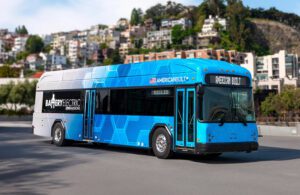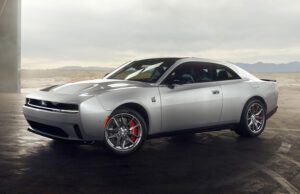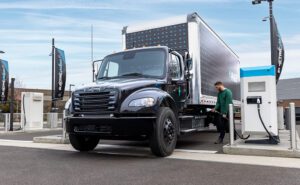According to the researchers, the system can transfer power across a wide air gap at more than 90% efficiency.
Search Results Found For: "WAVE charging"
Plugless Power launches wireless EV charging trial
Virginia-based Evatran announced today that it has agreed with six commercial EV users to equip their fleets of Volts and Leafs with pre-production Plugless Power wireless charging systems.
GILLIG to supply Seattle transit agency with up to 395 battery-electric buses
Transit bus giant GILLIG has announced a new five-year contract with King County Metro, which serves the greater Seattle area. GILLIG will deliver an initial order of 89 GILLIG Low Floor Battery Electric buses, with the option to purchase up to 306 more units. Built on GILLIG’s Low-Floor platform, the GILLIG Battery Electric Bus features… Read more »
Sepion gains safety certification for lithium-metal pouch cells for EV batteries
US-based Sepion Technologies, which develops nanoengineered separator coatings and liquid electrolytes for EV batteries, has received UN/DOT 38.3 safety certification for its lithium-metal pouch cells. UN/DOT 38.3 is an essential certification required for manufacturers and suppliers involved in transporting and distributing lithium batteries by air, sea and land to ensure the safety of passengers, crew… Read more »
Panduit offers industrial electrical products for every EV charger, panel and cabinet
Sponsored by TTI. As we transition to a world of Electrified products, energy distribution must be modernized, upgraded, and integrated with innovative infrastructure to support our changing demands. One of the key value propositions that Panduit brings to the EV Supply Equipment industry is its unwavering commitment to reliability and performance. In an environment where… Read more »
How to protect an EV’s on-board charger from transient grid surges
Sponsored by TTI. The automotive environment is one of the most severe environments for electronics. Today’s vehicle designs proliferate with sensitive electronics, including electronic controls, infotainment, sensing, battery packs, battery management, electric vehicle powertrains, and on-board chargers. In addition to the heat, voltage transients, and electromagnetic interference (EMI) in the automotive environment, the on-board charger… Read more »
Aqua Metals is building a more sustainable battery recycling ecosystem
Q&A with Aqua Metals execs Steve Cotton and David Regan Regardless of the claims made in Facebook memes, Li-ion batteries are eminently recyclable, and current recycling methods cause far less environmental damage than the well-documented depredations of the petroleum industry. However, as sustainability is central to the mission of the EV industry, we need to… Read more »
2024 Dodge Charger Daytona: the ‘Brotherhood of Muscle’ goes electric
The Charger sedan and Challenger coupe exuded testosterone, courtesy of snarling V-8s. Dodge says the EVs that replace them will be just as noisy. The 2024 Dodge Charger Daytona is a Detroit anomaly: it’s a passenger car in an age of trucks and SUVs, it’s battery-electric when U.S. makers seem to be in an EV… Read more »
The heavy-duty electric truck market could break out in 2024
Electrifying heavy-duty trucks is essential if we’re to fight climate change and air pollution, but the pace of the transition has been painfully slow—many, many pilots, but few truly large-scale orders. For example, shipping giant Schneider acquired 92 Freightliner eCascadias in 2023—a good start, but only that, considering that the company currently operates over 10,000… Read more »
How to protect an EV’s on-board charger from transient grid surges
Sponsored by Littelfuse. The automotive environment is one of the most severe environments for electronics. Today’s vehicle designs proliferate with sensitive electronics, including electronic controls, infotainment, sensing, battery packs, battery management, electric vehicle powertrains, and on-board chargers. In addition to the heat, voltage transients, and electromagnetic interference (EMI) in the automotive environment, the on-board charger… Read more »












